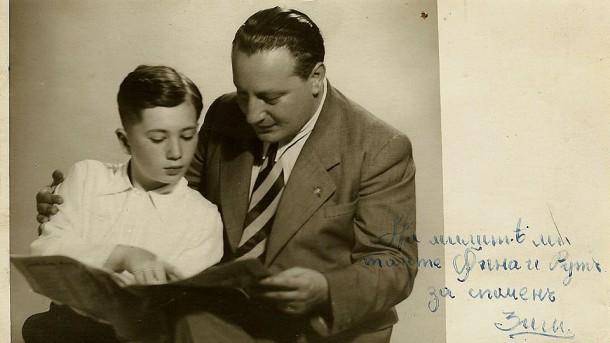He was the most handsome pianist of his time. Elegant, proud and unreachable, he looked as if he was born with a tailcoat in Sofia in 1929. This is how Berlin newspaper "Die Welt" described Alexis Weissenberg. Born in Sofia, the exclusive pianist received an excellent education in a cosmopolitan family – he attended an Italian school, used to talk to his parents in French, and communicated in Bulgarian with school friends. His mother, her sisters and brother were all graduates of the Vienna Conservatory. Alexis started taking piano lessons when he was 4 years old, and shortly after that it was great Bulgarian composer Pancho Wladigeroff who started teaching him. Here's what he said about the pianist:
 “I did not believe in child prodigies but when he came and sat behind the piano I saw his talent was extraordinary. I was impressed by the fact he had great ear for music. He perceived any style of music with all of his soul and was playing magnificently the concerts of Mozart in A major, C minor and D minor, Beethoven sonatas, works by Bach, Schumann, Chopin and Liszt.”
“I did not believe in child prodigies but when he came and sat behind the piano I saw his talent was extraordinary. I was impressed by the fact he had great ear for music. He perceived any style of music with all of his soul and was playing magnificently the concerts of Mozart in A major, C minor and D minor, Beethoven sonatas, works by Bach, Schumann, Chopin and Liszt.”
During the Second World War Bulgarian Jew Weissenberg managed in a dramatic way to escape from Bulgaria together with his mother. He received help from a German officer in love with the works of Schubert. Weissenberg reached Tel Aviv where he continued taking music lessons and at the age of 14 he performed Beethoven's Third Concerto together with the radio in Jerusalem. His first tour to South Africa followed, where he had 15 concerts with four different programs. At that time the legend about the heartless virtuoso who sold his soul to the devil in order to become master of the piano started circulating about his personality. In 1946 he won a scholarship and went to New York, where he graduated from Juilliard School. In 1947, he became laureate of the Leventritt Competition and gave his first concerts in Carnegie Hall. That is how the amazing international career of one of the most remarkable pianists of the twentieth century started. He performed in the best halls in Europe, the U.S., South America and Africa.
In 1967 Herbert von Karajan invited him to perform Tchaikovsky's Piano Concerto No. 1. This earned him great popularity and Weissenberg started receiving invitations for performances by Lorin Maazel, Claudio Abbado, Leonard Bernstein and others. Critics called him "A prince, who irradiates music.” A recording of Weissenberg, preserved in the Golden Fund of the Bulgarian National Radio is precisely the Tchaikovsky concert, conducted by Karajan.
In his autobiography music producer Michel Glotz paid special attention to Alexis Weissenberg:
"I cannot be silent about the huge knowledge of Alexis in the fields of literature, architecture, philosophy, theatre. He explores life as a wunderkind - thoughtful and surprised by the world. In the sphere of music, he knows no boundaries."
Throughout his life, the pianist helped a number of musicians to become world stars such as cellist Yo-Yo Ma, conductor Jean-Bernard Pommier and many others. Weissenberg returned to Bulgaria in 1972 with the help of his teacher Pancho Vladigerov. His desire to organize a competition named after the composer, in which Weissenberg was to invest personal funds was not welcomed. After the extraordinary concert of Weissenberg in this country, pianist Konstantin Ganev wrote: "It is difficult to describe in words the magical power of an artist with such a huge impact on audience. It lies in a number of conditions ranging from the appearance and behaviour on stage, to the depth of his spirituality, intellect and attitude. When he plays, even the smallest muscle of his face remains still in moments of supreme mental and physical strain. Everything is just sound - this perfectly clear like carved with a chisel piano sound that can transform endlessly."
"This is something internal, primary, independent of me, and purely psychological. I remained a Bulgarian in soul, in spirit, in imagination and will probably remain Bulgarian until the end"- the world-famous musician once said. Millions of his records were sold all over the world. But his relations with Bulgaria remained strong. The pianist used to say that he wanted to return to Bulgaria at the end of his life but he passed away in Switzerland on January 8, 2012.
English: Alexander Markov
In the summer of 1994 Bulgaria marked its 6 th participation in world finals. It was the 1994 FIFA World Cup and 9 months earlier God had become a Bulgarian for while. On 17 November 1993 a decisive battle took place at the Parc des Princes stadium in..
On December 30, 1992, President Zhelyu Zhelev’s economic advisor Professor Lyuben Berov became Bulgaria’ s new Prime Minister right after the fall of the cabinet headed by Premier Philip Dimitrov. Lyuben Berov was in charge of the country for two whole..
“Our task is to turn Bulgaria into a normal country, not a perfect one. Each human being finds it much more natural to live in a world, where the state doesn’t choke him by the throat, doesn’t determine his views or..

+359 2 9336 661
